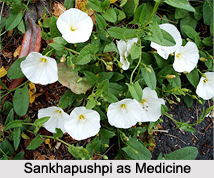 Sankhapushpi or Canscora Decussata is a little plant regarded as laxative, alterative and tonic and is much praised as a nervine. It is used in insanity, epilepsy and nervous debility. An herb widely used in Ayurvedic medicine as a brain tonic and memory enhancer, Sankhapushpi has been used for centuries as a means to promote higher intelligence.
Sankhapushpi or Canscora Decussata is a little plant regarded as laxative, alterative and tonic and is much praised as a nervine. It is used in insanity, epilepsy and nervous debility. An herb widely used in Ayurvedic medicine as a brain tonic and memory enhancer, Sankhapushpi has been used for centuries as a means to promote higher intelligence.
Dose of Sankhapushpi in Medicine
The fresh juice of the plant, in doses of about an ounce, is given, with the addition of honey and Pachak root, in all sorts of insanity. A paste made of the entire plant, including roots and flowers, is recommended to be taken with milk as a nervine and alterative tonic. The following compound powder is used in similar cases. Take gulancha, Achyranthes aspera (apamarga), baberang, Pachak root, root of Asparagus racemosus (satamuli), Acorus Calamus (vacha), chebulic myrobalan and Canscora decussata, in equal parts; powder and mix. It is said that the use of this powder for 3 days will enable a student to learn by rote a thousand couplets of poetry.
This article is a stub. You can enrich by adding more information to it. Send your Write Up to content@indianetzone.com
Related Articles
Ayurveda
Origin of Ayurveda
Ayurveda Medication
Elements of Ayurveda
Concepts of Ayurveda
Ancient Literature of Ayurveda
Sushruta Samhita
Classification of Medicine




















